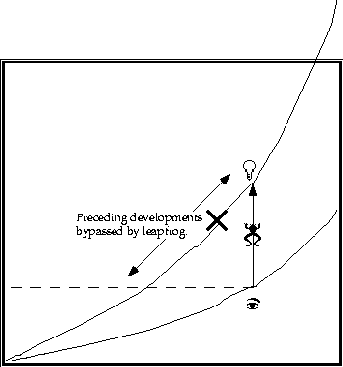
Figure 1: IT grows exponentially.
The world is moving towards an information society --- a new society that will have a major impact on the way all of us live and work. It will affect both manufacturing and services; it will affect education and communication; it will change health care and it will change government. In short, unless our nations are to become impoverished in new and particularly debilitating ways, no aspect of our lives is going to be untouched.
The industrialized nations are at the forefront of the information revolution. It is a revolution whose rate of change is rapid and constantly accelerating. The forces driving this accelerating change are being eagerly embraced by many of our developed nations. The positive feedback loops are in place: each advance, each workshop affirms the development and adds another push to the speeding train (See Figure 1)

Figure 1: IT grows exponentially.
Measurements show a doubling every one to four years.This diagram shows two growth paths in some area of IT. The top one is the global trend of innovation and the bottom one that of a country with some research and development that is able to keep global trends in sight. The backlog gets worse and worse even on the lower curve. Such a growth curve does however allow leap-frogging a generation and getting to the top when that is required. Not to be in sight of the global curve is a disaster: to fall off means that all is lost.
Will our society be left out of the information society? I believe not. Already it is obvious that the change is upon us and it must affect all. So: Will the effect be positive? What is needed to gain a positive outcome?
There are three factors that form the basis of the information society: first flexibility, second infrastructure and third people. On this shifting foundation the information society is rising up.
Are you perhaps surprised at the first requirement: ``flexibility''? Well, it truly is an information revolution that we face. Revolutions, even peaceful respectable revolutions, require great flexibility and agility. I believe this is one very great strength that our country can bring to the success in the information society: an acceptance and an eagerness for change, for accelerating change!
The second foundation stone is ``infrastructure'': the networks and the regulatory frameworks. Markets are global now. The infrastructure will be put in place, the forces are there to ensure that this investment happens. It is more important, by far, to consider the outcomes of this process. A constructive dialogue between investors and users will ensure that communications networks with capacity for the social requirements are put into place.
Then we have ``people'': the basic foundation of any society, and so also of the information society. This society is being built for the people and depends on them. Our one overriding aim must be: how to ensure the development and advancement of all people. There must be development for all: not merely some sectors of the nation. Our country cannot afford creating a newly privileged information technology elite.
Education and training are very important factors in ensuring the equitable development of the information age. I am optimistic. Information technology can be an effective helper for learning. If we do this, if we develop the skills of our people, then we are in very strong position to be full partners in developing the information society. Many people are needed to develop the applications and provide the content for the services of the information society. Developing countries are very favourably placed to contribute. Capital costs are low and the need for people immense and in many developing countries this has already favoured the creation of information technology enterprises.